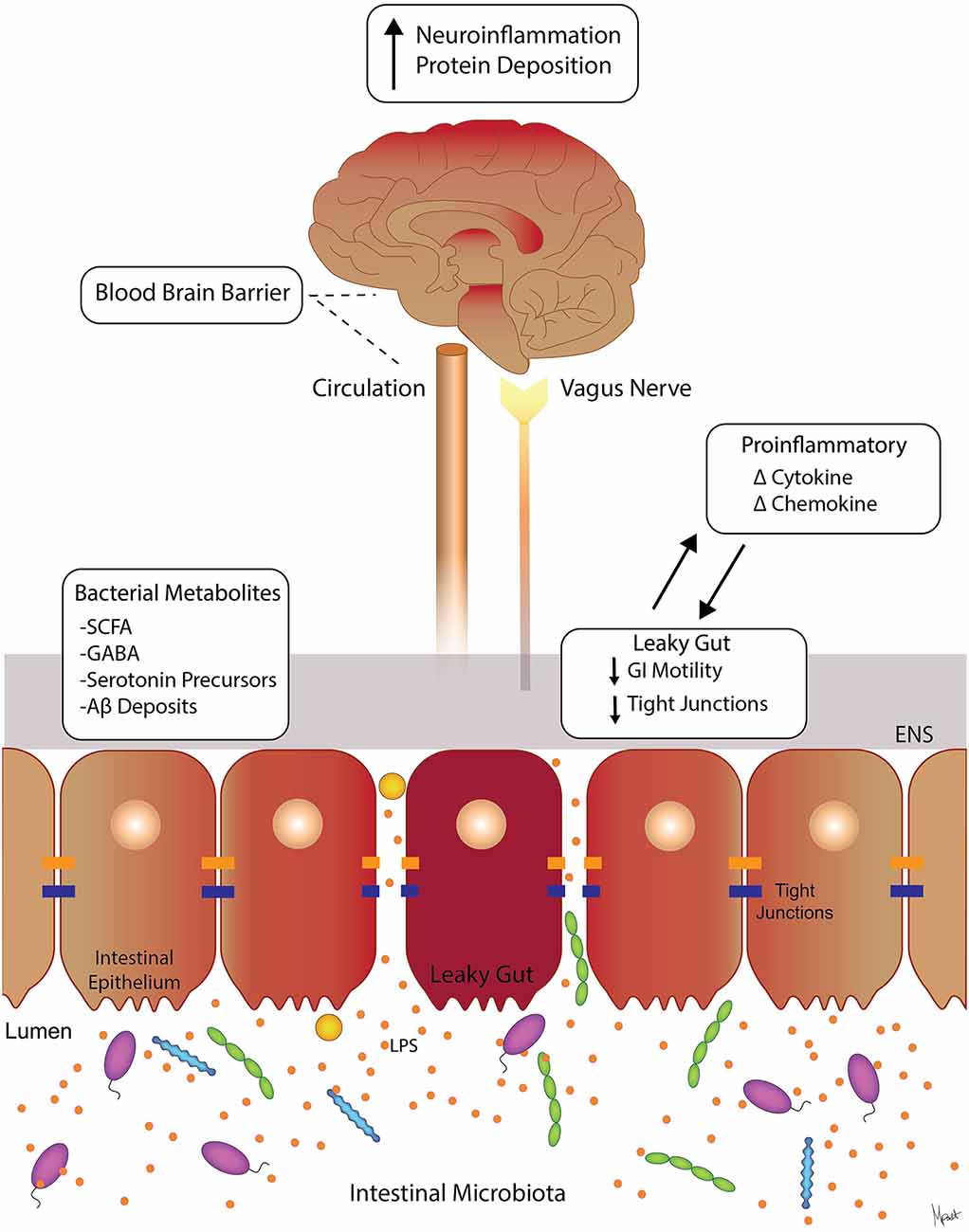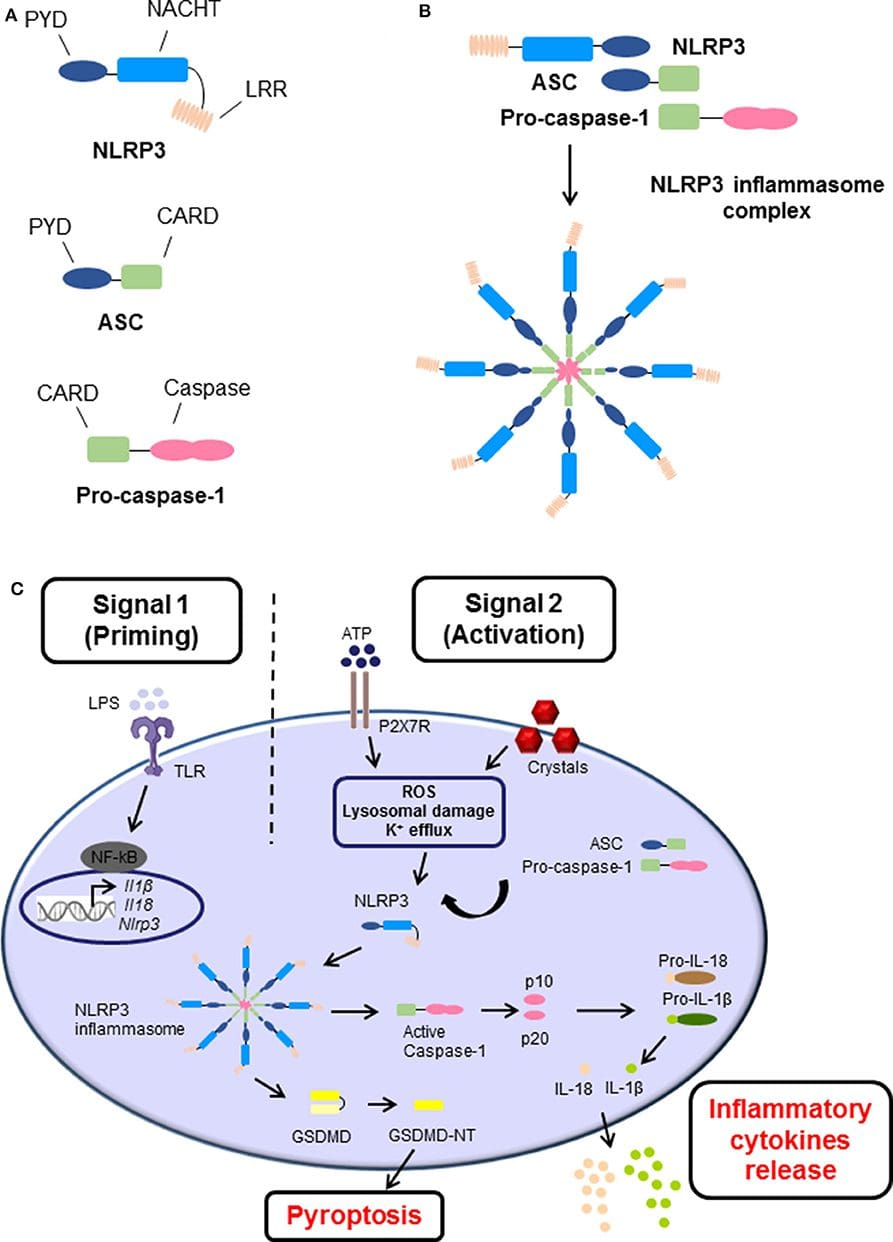Table of Contents
Introduction
The gut system is home to trillions of beneficial bacteria that helps biotransformed food into nutrients for the body to function correctly. The gut is also in constant communication with the brain as the neuron signals are in a bi-directional wavelength that helps move the nutrients to their designated areas in the body. These designated areas help the body as well, as they have their own set of instructions to work correctly while the body is in motion. When gut disorders like metainflammation start to disrupt the signals going back and forth between the brain and gut, it can cause various issues that can cause the body to become dysfunctional and progress into chronic inflammation. Today’s article discusses what metainflammation does to the gut-brain axis and how inflammasomes play their role in the gut-liver axis in the body. Referring patients to qualified, skilled providers who specialize in gastroenterology treatments. We provide guidance to our patients by referring to our associated medical providers based on their examination when it’s appropriate. We find that education is critical for asking insightful questions to our providers. Dr. Alex Jimenez DC provides this information as an educational service only. Disclaimer
Can my insurance cover it? Yes, it may. If you are uncertain, here is the link to all the insurance providers we cover. If you have any questions or concerns, please call Dr. Jimenez at 915-850-0900.
Metainflammation Affecting The Gut-Brain Axis
Have you been noticing an increase in food allergies or intolerances affecting you? How about feeling digestive problems rise on multiple occasions? Many of these symptoms are due to gut disorders like metainflammation, which can also affect the gut-brain axis in the body. Research studies have mentioned that the nervous system directly influences the gut through endocrine mediators interacting with microbial receptors. When metainflammation begins to affect the gut, it becomes the result of various gut dysbiosis like:
- Increased sleep and mood disturbances
- Fatigue
- Decreased performance and exercise ability
- Nutrient deficiencies – vitamin D, B vitamins
- Thyroid imbalance
Other research studies have shown that since inflammation is a common factor for various disorders affecting the body, it can do much damage when the inflammatory cytokines affect the gut-brain axis and the immune system. Meta inflammation causes a decrease in intestinal absorption and contractility, but it can also increase the defective tight junctions and intestinal permeability. This causes gut issues like Crohn’s and celiac disease to rise, causing increased insulin and immune dysregulation and brain issues like sleep, cognition, mood disturbances, anxiety, and psychiatric disorders.
An Overview On The Gut-Brain-Axis-Video
Have you been experiencing weight gain around your mid section? How about an increase in memory and cognitive decline? Have you felt a rise in chronic inflammation or immune problems? All these symptoms are signs that you could be experiencing metainflammation that affects the gut-brain axis in your body. The video above explains the gut-brain axis and how neurodevelopment disorders can affect the brain. Research studies have found that a mixture of dysbiosis and inflammation affects the gut, and it can cause the brain to be linked to many neurological disorders. With the bi-directional connection that the brain and gut have, many factors are constantly challenging both microbiomes that can progress inflammatory markers to rise in the body.
What Are Inflammasomes?
Inflammasomes are a family of proteins in charge of initiating the inflammatory process during the innate immune response. Inflammasomes are defensive microbes that cause inflammatory effects against infections and can even affect the gut-liver axis in the body if it turns chronic. What inflammasomes does is that they help pattern recognition receptors to know when the body is feeling stressed or in danger, as they are significant actors in the metaflammation construct. Research studies have shown that inflammasomes in the body can help secrete toxins into the invading microbes causing gut disorders.
How Does Inflammasome Affect The Gut-Liver Axis?
The gut-liver axis is connected with the intestines via bile acid metabolism. Bile acid dysregulation can lead to intestinal dysbiosis, which allows the gram-negative erogenous pathogenic bacteria and LPS to enter the liver. When this happens, it triggers hepatic inflammation via inflammasomes. Research studies have shown that chronic inflammation affecting the gut-liver axis can cause the inflammasomes to affect the epithelial wall integrity and even induce pro-inflammatory cytokine production, causing more issues in the body. In contrast, the NLRP3 inflammasome primarily induces IL‐1beta by causing bile acids to activate the NLRP3 inflammasome in macrophages. This induces bacterial translocation to allow pathogens, i.e., Bacteroidetes (Gram‐negative bacteria) and LPS, into the liver.
Conclusion
Overall, the gut-brain axis allows bi-directional communication to the entire body as the gut help regulates the metabolic function of the body. At the same time, the brain controls the signals and processes that the body encounters. When chronic issues like metainflammation or chronic inflammasomes begin to affect the gut, it can disrupt the bidirectional communication to the brain, causing the body to become dysfunctional. Incorporating small changes to confident life choices like adding supplements and nutraceuticals to dampen inflammation, eating healthier, and exercising can help relieve the gut. When many individuals make these small changes in their health and wellness journey, they can feel themselves have more energy, feel less inflammation affecting their gut, and move around more.
References
Clapp, Megan, et al. “Gut Microbiota’s Effect on Mental Health: The Gut-Brain Axis.” Clinics and Practice, PAGEPress Scientific Publications, Pavia, Italy, 15 Sept. 2017, https://www.ncbi.nlm.nih.gov/pmc/articles/PMC5641835/.
de Zoete, Marcel R, et al. “Inflammasomes.” Cold Spring Harbor Perspectives in Biology, Cold Spring Harbor Laboratory Press, 16 Oct. 2014, https://www.ncbi.nlm.nih.gov/pmc/articles/PMC4292152/.
Herradon, Gonzalo, et al. “Connecting Metainflammation and Neuroinflammation through the PTN-Mk-Rptpβ/ζ Axis: Relevance in Therapeutic Development.” Frontiers in Pharmacology, Frontiers Media S.A., 12 Apr. 2019, https://www.ncbi.nlm.nih.gov/pmc/articles/PMC6474308/.
Osadchiy, Vadim, et al. “The Gut-Brain Axis and the Microbiome: Mechanisms and Clinical Implications.” Clinical Gastroenterology and Hepatology : the Official Clinical Practice Journal of the American Gastroenterological Association, U.S. National Library of Medicine, Jan. 2019, https://www.ncbi.nlm.nih.gov/pmc/articles/PMC6999848/.
Wang, Junfeng, et al. “Roles of the Inflammasome in the Gut‑Liver Axis (Review).” Molecular Medicine Reports, D.A. Spandidos, Jan. 2019, https://www.ncbi.nlm.nih.gov/pmc/articles/PMC6297761/.
Disclaimer
Post Disclaimer
Professional Scope of Practice *
The information on this blog site is not intended to replace a one-on-one relationship with a qualified healthcare professional or licensed physician and is not medical advice. We encourage you to make healthcare decisions based on your research and partnership with a qualified healthcare professional.
Blog Information & Scope Discussions
Welcome to El Paso's Premier Wellness and Injury Care Clinic & Wellness Blog, where Dr. Alex Jimenez, DC, FNP-C, a board-certified Family Practice Nurse Practitioner (FNP-BC) and Chiropractor (DC), presents insights on how our team is dedicated to holistic healing and personalized care. Our practice aligns with evidence-based treatment protocols inspired by integrative medicine principles, similar to those found on this site and our family practice-based chiromed.com site, focusing on restoring health naturally for patients of all ages.
Our areas of chiropractic practice include Wellness & Nutrition, Chronic Pain, Personal Injury, Auto Accident Care, Work Injuries, Back Injury, Low Back Pain, Neck Pain, Migraine Headaches, Sports Injuries, Severe Sciatica, Scoliosis, Complex Herniated Discs, Fibromyalgia, Chronic Pain, Complex Injuries, Stress Management, Functional Medicine Treatments, and in-scope care protocols.
Our information scope is limited to chiropractic, musculoskeletal, physical medicine, wellness, contributing etiological viscerosomatic disturbances within clinical presentations, associated somato-visceral reflex clinical dynamics, subluxation complexes, sensitive health issues, and functional medicine articles, topics, and discussions.
We provide and present clinical collaboration with specialists from various disciplines. Each specialist is governed by their professional scope of practice and their jurisdiction of licensure. We use functional health & wellness protocols to treat and support care for the injuries or disorders of the musculoskeletal system.
Our videos, posts, topics, subjects, and insights cover clinical matters and issues that relate to and directly or indirectly support our clinical scope of practice.*
Our office has made a reasonable effort to provide supportive citations and has identified relevant research studies that support our posts. We provide copies of supporting research studies available to regulatory boards and the public upon request.
We understand that we cover matters that require an additional explanation of how they may assist in a particular care plan or treatment protocol; therefore, to discuss the subject matter above further, please feel free to ask Dr. Alex Jimenez, DC, APRN, FNP-BC, or contact us at 915-850-0900.
We are here to help you and your family.
Blessings
Dr. Alex Jimenez DC, MSACP, APRN, FNP-BC*, CCST, IFMCP, CFMP, ATN
email: [email protected]
Licensed as a Doctor of Chiropractic (DC) in Texas & New Mexico*
Texas DC License # TX5807
New Mexico DC License # NM-DC2182
Licensed as a Registered Nurse (RN*) in Texas & Multistate
Texas RN License # 1191402
ANCC FNP-BC: Board Certified Nurse Practitioner*
Compact Status: Multi-State License: Authorized to Practice in 40 States*
Graduate with Honors: ICHS: MSN-FNP (Family Nurse Practitioner Program)
Degree Granted. Master's in Family Practice MSN Diploma (Cum Laude)
Dr. Alex Jimenez, DC, APRN, FNP-BC*, CFMP, IFMCP, ATN, CCST
My Digital Business Card





Comments are closed.